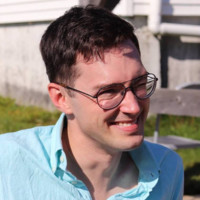
Jesse P. Hiltz
- Courses1
- Reviews3
- School: University of King's College
- Campus:
- Department: History
- Email address: Join to see
- Phone: Join to see
-
Location:
Halifax, NS - Dates at University of King's College: February 2015 - January 2017
- Office Hours: Join to see
Biography
University of King's College - History
Research Officer at Nova Scotia Office of Intergovernmental Affairs
Higher Education
Jesse
Hiltz
Canada
Researcher for NS, Former Professor at Ukings College, Program Coordinator at CCEPA, and co-host of Bookings Podcast. Diverse interests, including science fiction and film, with a graduate degree in history of science, philosophy, and social theory. Directs films sometimes.
Experience
University of King's College
Adjunct Faculty
2nd year course that used science fiction film to explore topics in the history of science and technology (HSTC2500: Science Fiction in Film W2015&F2015). Co-taught 3rd year course on industrial and economic uses of modern technology and research (HSTC3611: Money, Muscles, Machines W2016).
University of King's College
Teaching Assistant
TA for Early Modern Studies, History of Science and Technology, and Contemporary Studies.
University of King's College
Faculty Fellow in the Humanities
Team taught great books programme.
Concordia University
Research Assistant
Researching in the history of Canada/US relations.
Concordia University
Researcher
Research and publishing in relation to philosophy of science education, designing education module for International Barcode of Life Project.
Dalhousie University
Teaching Assistant
TA for the Philosophy department
Canadian Centre for Ethics in Public Affairs
Program Coordinator
Jesse worked at Canadian Centre for Ethics in Public Affairs as a Program Coordinator
Nova Scotia Office of Intergovernmental Affairs
Research Officer
Jesse worked at Nova Scotia Office of Intergovernmental Affairs as a Research Officer
Education
University of King's College
BAH
Philosophy, Contemporary Studies
University of King's College
Adjunct Faculty
2nd year course that used science fiction film to explore topics in the history of science and technology (HSTC2500: Science Fiction in Film W2015&F2015). Co-taught 3rd year course on industrial and economic uses of modern technology and research (HSTC3611: Money, Muscles, Machines W2016).University of King's College
Teaching Assistant
TA for Early Modern Studies, History of Science and Technology, and Contemporary Studies.University of King's College
Faculty Fellow in the Humanities
Team taught great books programme.Trent University
MA
Theory, Culture and Politics
Publications
The Biosphere and Noosphere: Vladimir Vernadsky and Teilhard de Chardin
SynergieWissen
Theories of the biosphere have become crucial for environmental sciences such as ecology, biogeochemistry, environmental ethics, and sustainability science. In many ways, theories of the noosphere are logical, though more speculative, extensions of biosphere theories. While noosphere theories have met with more suspicion, they too have been influential to many subjects such as artificial intelligence, transhumanism, and global communication technologies.1) The historical development of these influential theories are much like an ellipse, containing two foci that are related, though distinct. We see this metaphor played out between French paleoanthropologist and Jesuit Priest Pierre Teilhard de Chardin (1881-1955) and Russian geochemist and naturalist Vladimir Vernadsky (1863-1945), both of whom are credited with developing the biosphere/noosphere theories in their earliest systematic forms. [...]
The Biosphere and Noosphere: Vladimir Vernadsky and Teilhard de Chardin
SynergieWissen
Theories of the biosphere have become crucial for environmental sciences such as ecology, biogeochemistry, environmental ethics, and sustainability science. In many ways, theories of the noosphere are logical, though more speculative, extensions of biosphere theories. While noosphere theories have met with more suspicion, they too have been influential to many subjects such as artificial intelligence, transhumanism, and global communication technologies.1) The historical development of these influential theories are much like an ellipse, containing two foci that are related, though distinct. We see this metaphor played out between French paleoanthropologist and Jesuit Priest Pierre Teilhard de Chardin (1881-1955) and Russian geochemist and naturalist Vladimir Vernadsky (1863-1945), both of whom are credited with developing the biosphere/noosphere theories in their earliest systematic forms. [...]
Transferences and Cessation: The Destabilization of the Life/Death Binary in Organ Transplantation.
Gnosis: Journal of Philosophy Vol 10, No 3 (2009): Life, Death, and Power
The Biosphere and Noosphere: Vladimir Vernadsky and Teilhard de Chardin
SynergieWissen
Theories of the biosphere have become crucial for environmental sciences such as ecology, biogeochemistry, environmental ethics, and sustainability science. In many ways, theories of the noosphere are logical, though more speculative, extensions of biosphere theories. While noosphere theories have met with more suspicion, they too have been influential to many subjects such as artificial intelligence, transhumanism, and global communication technologies.1) The historical development of these influential theories are much like an ellipse, containing two foci that are related, though distinct. We see this metaphor played out between French paleoanthropologist and Jesuit Priest Pierre Teilhard de Chardin (1881-1955) and Russian geochemist and naturalist Vladimir Vernadsky (1863-1945), both of whom are credited with developing the biosphere/noosphere theories in their earliest systematic forms. [...]
Transferences and Cessation: The Destabilization of the Life/Death Binary in Organ Transplantation.
Gnosis: Journal of Philosophy Vol 10, No 3 (2009): Life, Death, and Power
ADHD, an Entity within the Crisis of the Field
Playing the Field Conference Proceedings - York - SocAnthroCon
This paper represents a distillation of a much larger project called “The Straying of Entities: On the Historical Ontology of Attention Deficit.” This paper claims that historically, theories of attention are formulated according to the ways that knowledge and practices are enclosed. That is, attention is formulated in-part according to how a field or body of knowledge is self-referential. Foucault describes a striking example of enclosure in Discipline and Punish, where disciplinary enclosures are understood as strict and limited units of knowledge, time,and space. Current theories of Attention-Deficit/Hyperactivity Disorder (ADHD) suggest that this way of understanding knowledge and practice no longer works,and that our current condition may be understand as a crisis of such enclosures, as described by Gilles Deleuze. This paper claims that attention is an organizing concept, that ADHD was formulated in-between enclosures, as a symptom of crisis, and thus does not belong to a single field or disciplinary enclosure. Keywords Attention, Foucault, Deleuze, Attention-Deficit, concept,epistemology
